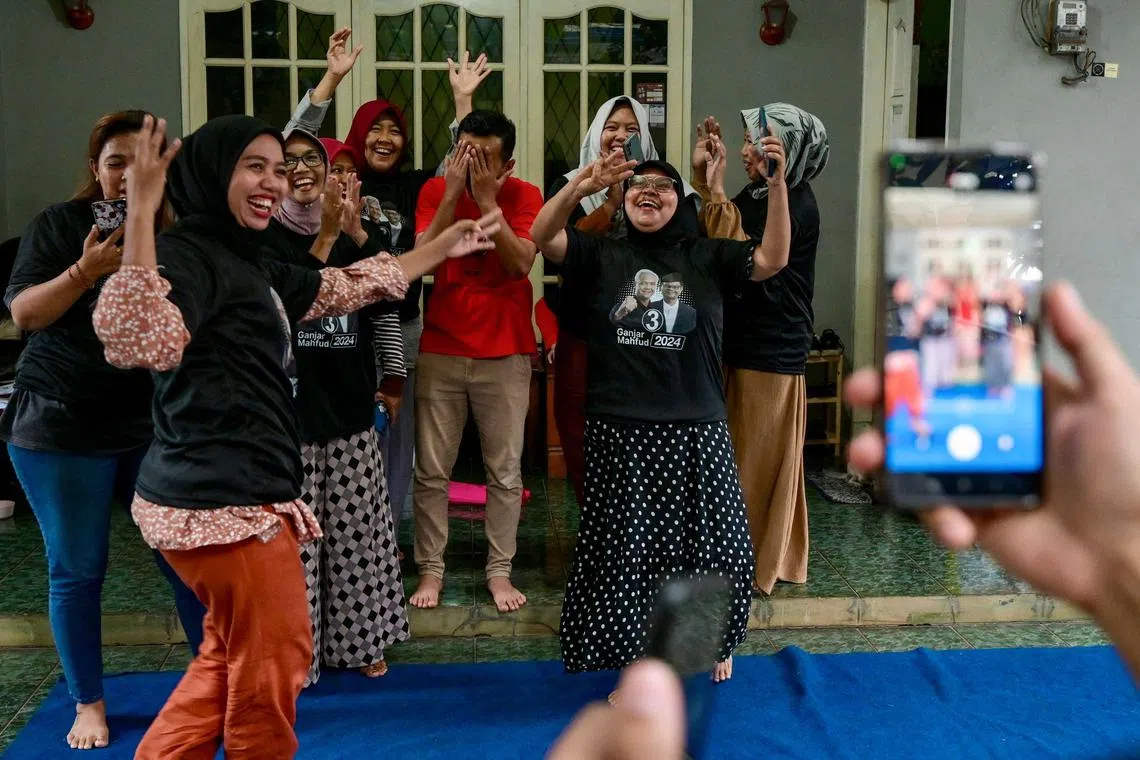Dance moves and deepfakes: Indonesia’s presidential candidates duke it out on TikTok
Sign up now: Get insights on Asia's fast-moving developments

Indonesia's presidential candidates are posting videos on social media in a bid to appeal to young voters.
PHOTO: AFP
Follow topic:
JAKARTA - At an Indonesian presidential campaign event, 22-year-old voter Irene Putri Aisyah was busy uploading everything she saw – from cute dances to cooking demonstrations – to short-video app TikTok.
To court young voters like Irene, all three candidates in the Feb 14 race to lead Indonesia
But experts say the platform is also flooded with problematic content that attempts to manipulate young voters, who make up over half of the roughly 205 million registered voters in the country.
In this new online battleground, Mr Prabowo Subianto, a once-feared military man, has rebranded himself as a cuddly statesman. Videos of his awkward dance moves, reminiscent of local martial arts, have garnered millions of views, inspiring others to mimic him.
When the front runner faced stinging barbs from rivals in a televised debate, women supporters shared videos of themselves crying for Mr Prabowo.
Rivals Anies Baswedan and Ganjar Pranowo have also ramped up their presence on the app, answering questions in real time during live-streamed sessions or sharing videos of heartfelt encounters with voters.
“TikTok is the most appealing app for first-time voters, so it does have a big influence as a platform to campaign and propagate election-related information,” said Ms Anita Wahid, a researcher who has worked with TikTok on issues related to online trust and safety.
Enduring popularity
During the campaign period, TikTok became Indonesians’ second-most used source of information on politics, after television, according to a January survey by pollster Indikator Politik Indonesia.
Voter Irene said: “We can easily find information about Prabowo on TikTok.”
But experts have flagged that some of this information may be incorrect.
Dr Endah Triastuti, a communications researcher at the University of Indonesia, said that because of such content, many young voters may not be aware that Mr Prabowo has been forced to deny allegations of human rights abuses during his time as special forces commander.
Manipulated images and deepfake videos of the candidates have also been widely circulated.
TikTok says on its website that its policy is to remove “harmful misinformation” and work with fact-checkers to flag or debunk it. Political ads and fund raising are also banned on the platform.
A TikTok spokesperson said in an e-mail: “We prioritise protecting the integrity of elections on our platform so that our community can continue to enjoy creative and entertaining TikTok experiences.”
Young voters prefer to see candidates create fun content, which explains the app’s enduring appeal and success in this election, noted Ms Anita.
“This is a new battle,” she said. REUTERS

